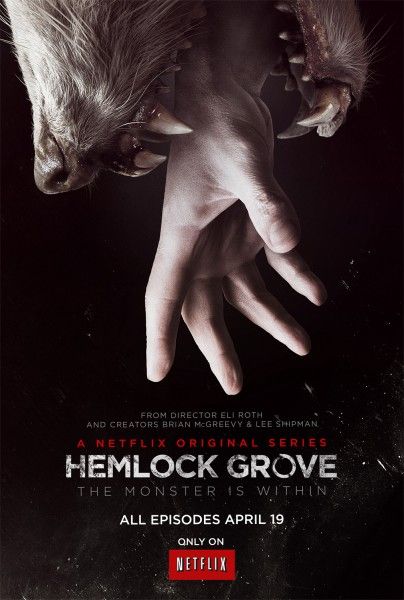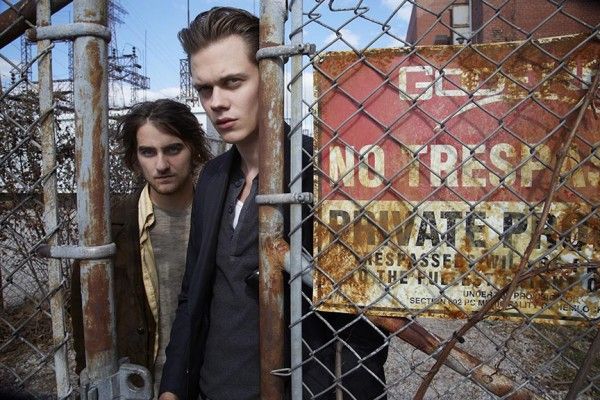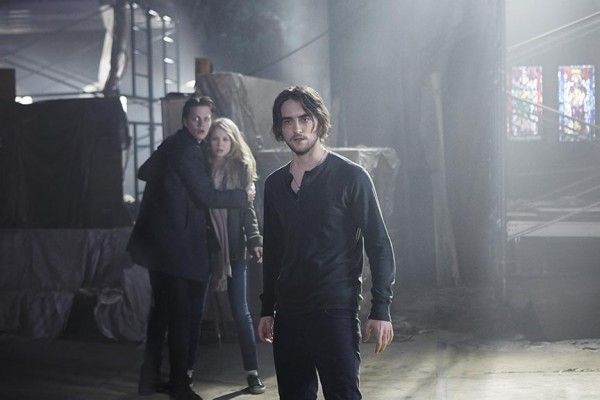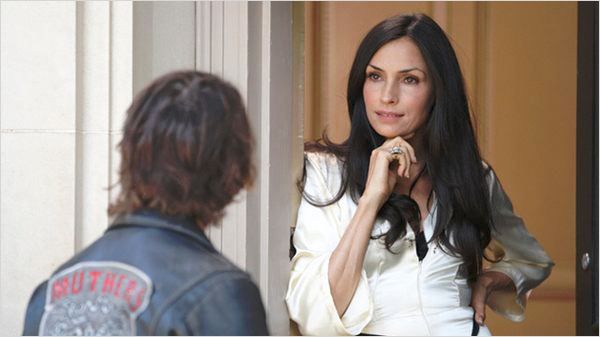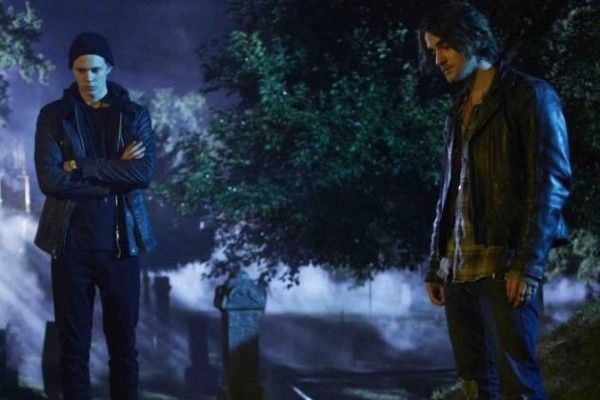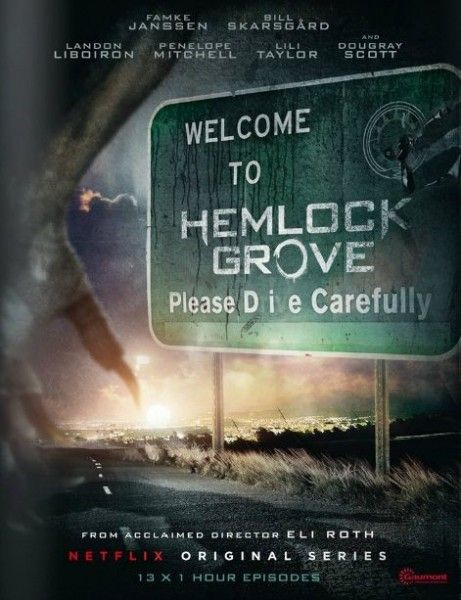Hemlock Grove, based on Brian McGreevy’s novel of the same name, puts a spin on the current trend of werewolves and vampires, replacing love triangles with body parts and unconsummated longing with raunchy, bloody sex. The story picks up in the small town of Hemlock Grove following a string of grisly murders when new boy in town, Peter Rumancek, gypsy trailer trash and rumored werewolf, comes under suspicion for the crime. Peter finds an unlikely ally in Roman Godfrey, golden boy of the wealthy and influential Godfrey estate, Hemlock Grove’s resident wealthy philanthropists in the model of the Carnegies. Together the pair attempts to solve the mystery of the murder before the killer can strike again. From Producers Eli Roth, Lee Shipman, and Mark Verheiden, the show stars Famke Janssen, Dougray Scott, Lili Taylor, Bill Skarsgard, Landon Liboiron, Penelope Mitchell, Freya Tingley, Kandyse McClure, and Aaron Douglas, and premieres April 19th on Netflix.
Shortly before the WonderCon panel producers Mark Verheiden, Brian McGreevy, and Lee Shipman sat down for a roundtable interview. We talked about the creative freedom of working on Netflix, how close the show sticks to the book, translating the story from page to screen, the mythology of the story, Peter and Roman’s relationship, Hemlock Grove’s roots in Pittsburgh and more. Check out the full interview after the jump. Please be aware that this interview has light spoilers for the first three episodes.
You guys have brought a very dark series to our television sets.
BRIAN MCGREEVY: We have tried, we have tried.
LEE SHIPMAN: That’s the goal, but maybe not TV sets.
Will the mystery of who’s killing these young girls be solved by the end of season one? It’s a concern now for audiences, when they binge watch they want to know that they’re going to get a payoff.
SHIPMAN: It will be completely satisfying.
MARK VERHEIDEN: Basically, if it were to end with season one you would have a satisfying conclusion, but we’re hoping it doesn’t.
Audiences just aren’t willing to go past a certain point with a mystery these days, they’re too impatient.
MCGREEVY: I would say that we’re the same kind of viewer. I think narratively it is a mistake to try and stretch your story that much, so during the writing of the book and then the construction of the season, it was absolutely something that we thought about.
How did creating a show with binge watching in mind and the knowledge that you wouldn’t have to stop for commercial breaks affect the way you wrote your episodes?
SHIPMAN: Hugely. [Brian and I] had never done television before, we were coming out of features and one of the most attractive aspects of the Netflix deal, with the straight to series order, was that we could write almost the entire series upfront before we shot a frame so we could really structure this thing, all these arcs, characters, stories, like a movie. That’s how we consume TV, that’s how Netflix subscribers consume TV, they binge watch. We want people to stay up way past their bedtimes.
VERHEIDEN: I have done other TV, this is the first time I’ve done a show without commercials, without act breaks, that can be any length. So if you’ve never had that you don’t understand how liberating it is and how naturally you fall into it, how great it is not to have to go, “Oh jeez, in ten pages somebody’s got to be hanging off a bridge.” And language, sexuality, all those things. You just go, “Oh, I don’t have to worry about any of that.”
MCGREEVY: As someone who spent five years writing the book, we could have gone a more traditional route as far as setting up the show, but I didn’t want the writing predicated by selling fucking Clorox.
What are the challenges of adapting your work across different media, is it a lot of killing your darlings?
MCGREEVY: Not really, the show adheres structurally to the book closely, which was one of the main reasons why Netflix bought it because if you look at their first wave of shows they’re all adaptations, or if you look at Arrested Development, it’s just a new season of an existing project. So they were pretty specific purchasing projects that have a built in architecture.
At what point does the story in the book and show diverge?
MCGREEVY: After Season 1.
VERHEIDEN: Season 2.
SHIPMAN: Yeah I would say there’s plenty of expansion in the series of the book that will surprise fans of the book.
VERHEIDEN: The funny thing about it is usually you take a book and try to compress it down for a movie and in this case we took the book and expanded it out some because we had 13 hours. We started with a great amount of material and then were able to collaborate on that some. There are surprises in it that if you read the novel you’re going to go, “Oh, that wasn’t in the book.”
SHIPMAN: One huge.
MCGREEVY: Yeah.
Will the mythology stay rooted in the Romani and Eastern European culture or will we see that branch out?
MCGREEVY: Both. You know the eastern European tradition is definitely the biggest inspiration, Pennsylvania itself, both in terms of its landscape and its cultural heritage is heavily- it both physically resembles eastern Europe and shitloads of them migrated there because of the steel industry so that was definitely a big reference point, but there’s a lot of room to expand this world and mythology.
SHIPMAN: Forgive my language, but of all the fucked up shit we do on this show there is a pretty fascinating intersection of supernatural and science.
Both the book and the town of Hemlock Grove itself have a very distinct character and tone, talk a little bit about the challenges of bringing that to the screen.
VERHEIDEN: The production challenge is just to replicate it, but we got lucky and in Toronto we found an amazing mansion that we were able to use. There are not a lot of sets on this show, actually, which is surprising when you see the show, but we found a mansion that was run by the guy who ran Canadian Chevrolet or Ford or something and we were able to shoot in there. And then Hamilton, frankly, which is a Canada steel town, offered us a bunch of gritty, really creepy, unfortunate locations. It was funny how well we were able to actually capture it.
MCGREEVY: The mansion also had an august cinematic legacy as Billy Madison’s house.
Your show’s been described as a sort of love story between these two male characters, given the kind of mythology you’ve established that seems a bit simplistic, how would you describe it?
MCGREEVY: I think people would say that because it is a high concept show, it does have a pretty dense mythology, but the point of entry was really about these two young guys finding themselves and finding themselves in each other. That was definitely the emotional through line of the show, which has a fair amount of weird stuff happening in it.
Talk a little bit about the immediate bond between them.
MCGREEVY: We wanted to make sure that there was an emotional core underlining the story and I feel like especially attendees of WonderCon can sympathize with being an adolescent, not being the most conventionally socialized person, and then finding that other person that gets you, I mean, that is a great romance.
SHIPMAN: In the series there is a biomedical facility that was constructed here and it wasn’t built here by accident. There is something about this place that, not to reveal too much, but what’s happening here is not by accident.
So we’re going to see more of the Godfrey Institute and what’s going on there?
SHIPMAN: Much more.
There’s a lot of passing reference to the economic disparity of the town, are we going to see more of that?
MCGREEVY: That’s the drama which is happening between Peter and Roman, but also this is true of what’s happening in Pittsburgh, the division of wealth is pretty insane in that city where you have a neighborhood where it was formerly the blue collar middle class when there was industry there that no longer exists so it’s just basically crack dens next to upper class doctors, NPR listeners who are working at Carnegie Mellon. So that, to me, was just semi-accurately reporting the conditions where I came from.
You guys are cloaking some of your supernatural elements in such a way that the characters don’t even know that they’re supernatural, in the case of Roman he’s completely unaware that there might be something going on with him.
MCGREEVY: I think he’s more in denial about it in the same way that he’s also capable of some pretty dark and violent mood swings that he’s equally in denial of, which I think is fairly representative of human beings as a whole, but it’s definitely representative of the hugely sensitive, moody 17 year old males.
He’s not even just in denial; he chose the role of the hero right away.
MCGREEVY: But that itself was a kind of denial. Basically he is establishing his own identity through negation. “I am not that.” It’s like bitch, please, you need to meditate on that a little longer.
You would think a boy with his proclivities, abilities and resources would choose to go down a darker path, instead he’s imposing boundaries on himself and choosing a better life. It’s unusual for the bad boy to choose to be the hero.
VERHEIDEN: But everybody wants to be the hero of their own story and I think that’s Roman. He doesn’t want to believe he’s this dark character; he wants to believe there’s good in him.
MCGREEVY: In my experience of being a 17 year old male, they all think they’re fucking Batman.
Click here for all our Hemlock Grove coverage and here's all our WonderCon coverage.


